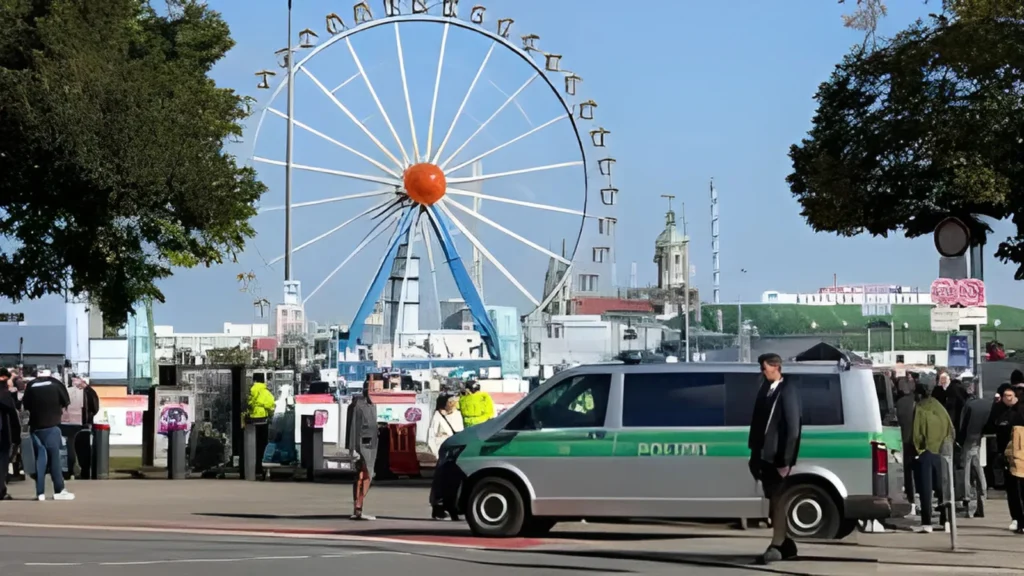Explosion Forces Festival Closure
On Wednesday morning, Munich’s world-renowned Oktoberfest was shut down after an explosion and fire at a residential building in the city, with police citing a bomb threat potentially linked to the incident. The fairgrounds remained closed until the evening as authorities conducted thorough security sweeps and investigations.
Also Read: Gas explosion triggers bronx building collapse in Newyork USA

What Happened in Munich
- Around 4:40–5:00 a.m. local time, a house fire and explosion broke out in Munich’s Lerchenau district, believed to be a result of deliberate arson tied to a domestic dispute.
- Inside the residence, authorities found booby traps and explosive devices, prompting special-forces involvement.
- Casualties: One person (the alleged suspect) was found dead, while two others — the suspect’s 81-year-old mother and 21-year-old daughter — were injured and hospitalized. Another person was reported missing but not deemed dangerous.
- A letter discovered after the blast contained a bomb threat targeting the Oktoberfest site.
- As a precaution, the Theresienwiese fairgrounds were shut down until 5 p.m., when police confirmed no additional danger and declared the area safe for reopening.
This temporary closure was the first security-related shutdown in Oktoberfest’s recent history.
About Oktoberfest
History of the Festival
Oktoberfest traces its roots back to 1810, when Bavarian Crown Prince Ludwig (later King Ludwig I) married Princess Therese of Saxony-Hildburghausen. The wedding celebration, held on the Theresienwiese (named after the princess), included horse races and festivities. The event was so popular that it became an annual tradition, eventually evolving into the modern Oktoberfest.
When and Where
- Location: Theresienwiese, Munich, Germany
- Duration: Late September to early October (about 16–18 days)
- Attendance: More than 6 million visitors annually
Key Highlights
1. Beer & Breweries
Only six Munich breweries can serve beer at Oktoberfest: Augustiner, Hofbräu, Löwenbräu, Paulaner, Spaten, and Hacker-Pschorr. They brew a special Märzen beer, stronger and maltier than regular lagers, served in 1-liter steins known as Maß.
2. Food
Traditional Bavarian delicacies include:
- Pretzels (Brezn)
- Roast chicken (Hendl)
- Pork knuckles (Schweinshaxe)
- Sausages (Würstl)
- Potato dumplings (Knödel)
- Apple strudel and gingerbread hearts (Lebkuchenherzen)
3. Attire & Culture
Festivalgoers often wear traditional dress: Lederhosen for men and Dirndls for women. The event is filled with brass bands, folk dancing, parades, and festive singing.
4. Entertainment
Aside from beer tents, Oktoberfest features carnival rides, Ferris wheels, and family attractions, making it enjoyable for all ages.
Fun Facts
- Around 7.5 million liters of beer are consumed every year.
- Over 500,000 roast chickens are served.
- The festival area covers about 420,000 square meters.
- Oktoberfest has been canceled only a few times in history — during wars and the COVID-19 pandemic.
Conclusion
While the 2025 Oktoberfest faced an unexpected interruption due to a tragic explosion and bomb threat earlier this week, the festival has since reopened safely. The incident highlighted the importance of public safety, but it did not overshadow the enduring spirit of this centuries-old Bavarian tradition.
Oktoberfest remains a celebration of culture, community, and hospitality — and despite challenges, it continues to welcome millions from around the world each year